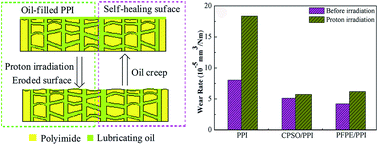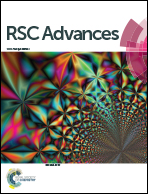Highly stable tribological performance and hydrophobicity of porous polyimide material filled with lubricants in a simulated space environment
Abstract
Space exploitation and development need high-performance materials for spacecraft so as to maintain the long service life and reliability of mechanical equipment. The purpose of the present study was to exploit a new material with durable life, stable friction coefficient and low wear rate in harsh space environments. Two kinds of solid–liquid synergetic lubricating composites have been prepared using perfluoropolyethers (PFPE) or chlorinated phenyl and methyl terminated silicone oil (CPSO) filled in porous polyimide (PPI). The tribological performance and hydrophobicity of the oil-filled PPI were evaluated by contact angle analyses and a ball-on-disk tribometer before and after proton irradiation in a simulated space environment. After proton irradiation, two composites can maintain stable hydrophobic performance. More importantly, the friction coefficients of CPSO/PPI and PFPE/PPI increased slightly from 0.07 and 0.05 to 0.1 and 0.14, respectively. The wear rates of CPSO/PPI and PFPE/PPI also increased slightly from 5.13 × 10−5 mm3 N−1 m−1 and 4.23 × 10−5 mm3 N−1 m−1 to 5.75 × 10−5 mm3 N−1 m−1 and 6.19 × 10−5 mm3 N−1 m−1, respectively. The CPSO/PPI composite showed the smallest change in hydrophobicity, friction coefficient and wear rate before and after proton irradiation. The mechanism of highly stable hydrophobicity and tribological performance was mainly based on a continuous self-healing surface; the stored oil in the pores of PPI can creep to the surface of the material to repair the damage induced by proton irradiation, which ensured that the material had stable and durable hydrophobicity and tribological properties in a proton irradiation environment.


 Please wait while we load your content...
Please wait while we load your content...